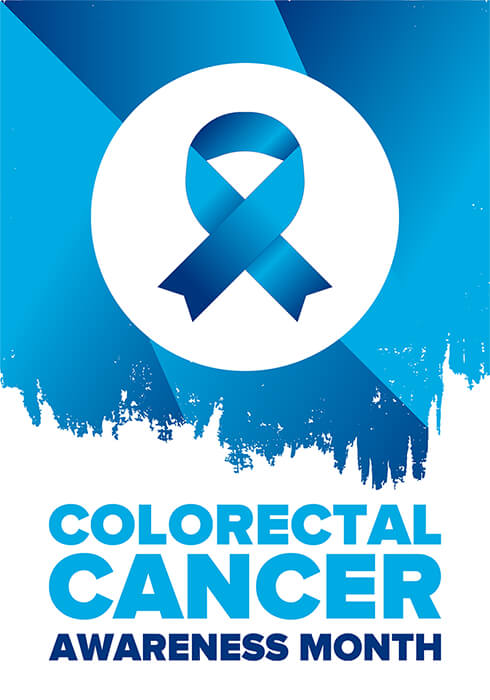March is Colorectal Cancer Awareness Month. Incidences of colorectal cancer are rising in people under age 50. That makes it even more important for adults to understand their individual risk and take steps to be screened for colorectal cancer.
What is Colorectal Cancer?
Colorectal cancer is cancer that develops in the large intestine (colon) or the part of the large intestine that connects to the anus (rectum). Most colorectal cancers begin as polyps—small growths in the lining of the intestine. Polyps, even noncancerous ones, can be removed during a colonoscopy, which is why we say that colorectal cancer screening can also be preventive. Removing a polyp before it becomes cancerous is a cancer prevention strategy.
About 95% of colorectal cancers are not inherited. However, some inherited syndromes are linked to colorectal cancer, and some ethnic groups have much higher incidences of colorectal cancer than others.
Who is at Risk for Colorectal Cancer?
Anyone can get colon cancer, but there are a number of factors that increase your risk.
Age. Most people who get colon cancer are over age 50, but the rates of colon cancer are increasing in younger people, and doctors aren’t sure why.
Being Black. The Black community has the highest rates of colorectal cancer in the United States. If you are Black, you are 20% more likely to develop this form of cancer and about 40% more likely to die from it than other racial or ethnic groups in the U.S. Black women have a higher mortality rate than women from any other group, and Black men are more likely than Black women to die from this disease.
Being of Ashkenazi Jewish descent. This ethnic group has one of the highest risk rates of any group worldwide.
Having a specific inherited syndrome. Individuals with Lynch syndrome (HNPCC) and familial adenomatous polyposis (FAP), are at higher risk of developing colorectal cancer. While rare, these cases still make up about 5% of colorectal cancers. Genetic testing can determine whether family members are carriers of these gene mutations, enabling earlier intervention and medical management to help reduce risk.
History of colon polyps. Even if your colon polyps are noncancerous, they raise your risk of developing cancerous polyps.
History of colon, rectal, ovarian, or uterine cancer. If you’ve had any of these cancers in the past, your risk is elevated.
Inflammatory intestinal conditions. Chronic inflammatory bowel disease (IBD) such as ulcerative colitis or Crohn’s disease raises your risk of developing colon cancer.
Type 2 Diabetes. Type 2 diabetics are at higher risk of developing colorectal cancer.
Lifestyle Factors that Affect Colon Cancer Risk
Many risk factors for colon cancer can’t be avoided, such as your ethnic background or medical history. However, there are several risk factors that are within your control. You and your doctor can work together to reduce these external factors and protect your health.
Weight. Being overweight or obese increases your risk of developing colorectal cancer. Extra weight raises blood levels of insulin, insulin growth factor, and estrogen, which can increase the chance that cancer will develop. Obese people often have more low-level inflammation in their bodies, which also creates an environment conducive to cancer.
Activity Level. Being physically inactive or leading a highly sedentary lifestyle increases your risk.
Vitamin D. Low levels of vitamin D are associated with colorectal cancer.
Diet. Eating a lot of red and processed meat is linked to colon cancer, as is consuming meats cooked at high temperatures (fried, grilled, barbecued or broiled). These meats create chemicals that can lead to DNA mutations causing cancer.
Smoking and Alcohol Use. Smoking increases cancer risk. Moderate to heavy alcohol use is also associated with higher cancer risk.
The American Cancer Society guidelines provide recommendations for maintaining a healthy weight, lifestyle, and diet, all of which can reduce colorectal cancer risk. The recommendations include regular physical activity, incorporating fiber- and nutrient-rich foods into your diet, and curbing consumption of processed meats and foods, sugar-sweetened drinks, and refined grains.
Colorectal Cancer Screening
The American Cancer Society recommends that adults aged 45 years and older with an average risk of colorectal cancer undergo regular screening with either a high-sensitivity stool-based test or a structural (visual) examination, depending on patient preference and test availability. As a part of the screening process, all positive results on non-colonoscopy screening tests should be followed up with timely colonoscopy.
Symptoms of Colon Cancer
Any change in bowel habits that lasts more than a few days should be checked out by a physician. Any unexplained weight loss is also a red flag, as is blood in the stool. Other potential signs include persistent abdominal cramps, gas, or pain; a feeling that your bowel doesn’t empty completely, or weakness/fatigue. These are not always signs of cancer, but they should be evaluated by a physician.
Celebrate Colorectal Cancer Awareness Month by talking to your doctor about your individual risk and scheduling your colorectal cancer screening today.



